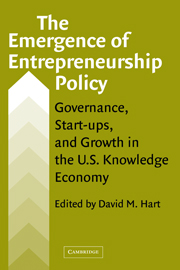 The Emergence of Entrepreneurship Policy
The Emergence of Entrepreneurship Policy Book contents
- Frontmatter
- Contents
- Editor's Acknowledgments
- Contributors
- PART ONE THE ENTREPRENEURIAL SOCIETY: WHAT'S GOVERNANCE GOT TO DO WITH IT?
- PART TWO HIGH-TECH ENTREPRENEURSHIP: THE UNIVERSITY-INDUSTRY-GOVERNMENT CONNECTION
- PART THREE EQUITY ISSUES IN ENTREPRENEURSHIP POLICY
- PART FOUR SECTOR-SPECIFIC ISSUES
- 9 Understanding Entrepreneurship in the U.S. Biotechnology Industry: Characteristics, Facilitating Factors, and Policy Challenges
- 10 E-Commerce, Entrepreneurship, and the Law: Reassessing a Relationship
- 11 Entrepreneurship and Government in Telecommunications
- PART FIVE IMPLEMENTING ENTREPRENEURSHIP POLICY
- Afterword
- References
- Index
10 - E-Commerce, Entrepreneurship, and the Law: Reassessing a Relationship
Published online by Cambridge University Press: 18 December 2009
- Frontmatter
- Contents
- Editor's Acknowledgments
- Contributors
- PART ONE THE ENTREPRENEURIAL SOCIETY: WHAT'S GOVERNANCE GOT TO DO WITH IT?
- PART TWO HIGH-TECH ENTREPRENEURSHIP: THE UNIVERSITY-INDUSTRY-GOVERNMENT CONNECTION
- PART THREE EQUITY ISSUES IN ENTREPRENEURSHIP POLICY
- PART FOUR SECTOR-SPECIFIC ISSUES
- 9 Understanding Entrepreneurship in the U.S. Biotechnology Industry: Characteristics, Facilitating Factors, and Policy Challenges
- 10 E-Commerce, Entrepreneurship, and the Law: Reassessing a Relationship
- 11 Entrepreneurship and Government in Telecommunications
- PART FIVE IMPLEMENTING ENTREPRENEURSHIP POLICY
- Afterword
- References
- Index
Summary
The commercialization of the Internet in the second half of the 1990s triggered a wave of entrepreneurial activity, as well as a burst of innovation and Schumpeterian “creative destruction” (Schumpeter 1942). Despite the eventual burst of the dot-com bubble, a number of ecommerce brands have become household names, and the services they offer are used by millions around the world. Entrepreneurship in the virtual world has frequently been compared with nineteenth-century gold rushes and land grabs (see Spar 2001: 2–4). As in the mountains and prairies of the Wild West, public policy seems to have no place on the virtual frontier, except to stifle, obstruct, and slow down the new breed of entrepreneurs and innovators.
In this chapter, I argue that this offhand rejection of public policy is mistaken. To make my case, I consider the relationship between law (which I conceive of as a subset of public policy) and entrepreneurship, using the ecommerce sector as a test case. In particular, I look in some detail at three functions of the law: leveling the playing field for market competition, protecting innovation, and enforcing transactional obligations. My interest lies in how these functions may serve to support ecommerce entrepreneurship, rather than to stifle it. Much more research into the interaction between law and entrepreneurship is needed to understand law's potential costs and benefits, so I proceed to suggest a preliminary agenda for further scholarship. Finally, I take the idea of entrepreneurship and apply it to law-making itself.
- Type
- Chapter
- Information
- The Emergence of Entrepreneurship PolicyGovernance, Start-Ups, and Growth in the U.S. Knowledge Economy, pp. 195 - 213Publisher: Cambridge University PressPrint publication year: 2003
